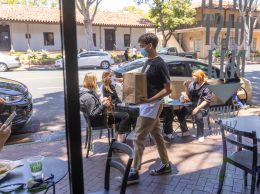When it comes to responding to the COVID-19 pandemic, each of the three counties is charting its own course.
San Luis Obispo County has been planning for the worst case scenario, even though the county has half the number of COVID-19 cases as their southern neighbors and case counts are rising slowly.
Santa Barbara County is making some preparations for the possibility of being overwhelmed with hospitalizations and fatalities, but it is far behind SLO County.
And in Ventura County, which has the highest number of coronavirus cases of all three counties, earlier reporting from the Business Times indicates hospitals that have undergone seismic retrofits have older buildings that could be outfitted for overflow patients.
The Ventura County Medical Center has capacity for 800 additional beds if needed, all on the existing campus, and 26 isolation beds have been added — raising the total across the county to about 110 isolation beds, according to Ashley Bautista, the county’s public information officer.
An alternate site requires a lot of time, effort and resources. SLO County officials said they have enough for now, and they’re even pulling back some of the stock for the alternate care site to use, but every hospital system in the region is accepting donations.
Hospitals and public health systems were supposed to get some measure of relief from the state stockpile, but even that has proven unreliable. Cottage Health received more than 200,000 N95 masks from the state, but when Cottage received them, the elastic had degraded to the point where the masks were no longer usable.
Still, members of the community continue to step up and help health care systems source the tools they need. CSU Channel Islands and MOXI, The Wolf Museum of Exploration + Innovation have both started printing plastic face shields to be used by hospitals in Ventura and Santa Barbara counties.
CSUCI is sourcing the plastic through a Camarillo company, American Plastics Corp., which offered to give the university the plastic for free.
“It was another way to give back,” said American Plastics President Robert Washington in a news release. “I and my entire staff are doing whatever we can to help. We’re grateful to be a part of the solution.”
That attitude has been prevalent through all three counties as communities prepare for the virus’ peak.
The SLO County alternate care site only came together as quickly as it did because of partnerships between private companies, the county and the Cal Poly San Luis Obispo campus.
RRM Design Group, Trust Automation and other companies helped provide the physical structures the county will need to treat people, and the county put out a call for medical help every day through news conferences.
The county also leaned heavily on hospital systems in the area to provide their leadership and expertise while designing the sites.
Mark Lisa, CEO of Tenet Health’s two hospitals on the Central Coast, said he reached out to other counties where the virus’s spread is more advanced to see if they had any plans or procedures for creating an alternate care site.
“I didn’t want to re-invent the wheel,” Lisa said.
There wasn’t much information available, and he didn’t get a response from other counties until well after the plans were made and being put into place. Those plans came to fruition on April 8, when SLO County’s most intensive preparation — an alternate care site to relieve pressure from area hospitals and prevent them from being overwhelmed — came online.
Patients would be treated in the school’s recreation center, using beds and tables from the dorms. The site is not going to be a full hospital, though, and it’s not meant to be. The only purpose it has is as an alternate for people who don’t need full hospital support, and Lisa acknowledged there’s a chance it might not be needed at all.
Still, he and county officials are preparing the site with the idea that it’s better to be safe than sorry.
Santa Barbara County has been making its own plans to treat more patients than it normally would, but SLO County compliance officer Michelle Shoresman said the county is prepared to let residents from other areas – like Santa Barbara County – use the facility if there’s need and space.
In Ventura County, much of the preparation effort has gone to securing medical supplies and equipment with Community Memorial among several that have asked for community donations of personal protective equipment and other gear. So far, hospitalizations in Ventura County have totaled 52, a number that existing hospitals have been able to handle.
However, all of the hospitals in the Tri-Counties have started identifying ways they can accommodate more people in a surge, and Cottage Health has identified ways to add 270 extra acute care beds if they need them.
The SLO facility can hold up to 900 patients, with about 600 medical professionals taking care of them. Lisa praised the space as he and several other officials walked through it on April 6.
“We owe a debt of gratitude to President Jeffrey Armstrong,” Lisa said. “You almost couldn’t find a better facility.”
The site was chosen because of a few qualities, including the amount of space it has, meaning more people can be treated there, as well as how easily it could be converted. In the basketball court, trusses hang over beds, with power cords at the ready.
The power cords are for both medical equipment and personal use. People won’t be able to visit their loved ones at the alternate care site, but officials still want people to be able to speak with their loved ones, as well as entertain themselves while at the site.
“We’re going to make it as comfortable as possible while trying to control as much as possible,” Lisa said.
As of press time, SLO County had completely vetted 230 medical professionals who volunteered to serve. Doctors, nurses and techs would work 12-hour shifts, with 50 patients per doctor, as well as 16 registered nurses and 16 patient care technicians.The county isn’t just looking for medical professionals, though. Anyone is welcome, especially those with administrative or veterinary backgrounds.
“Anyone can help out if there’s a desire,” Lisa said.
• Contact Amber Hair at ahair@pacbiztimes.com.






 Print
Print Email
Email

















